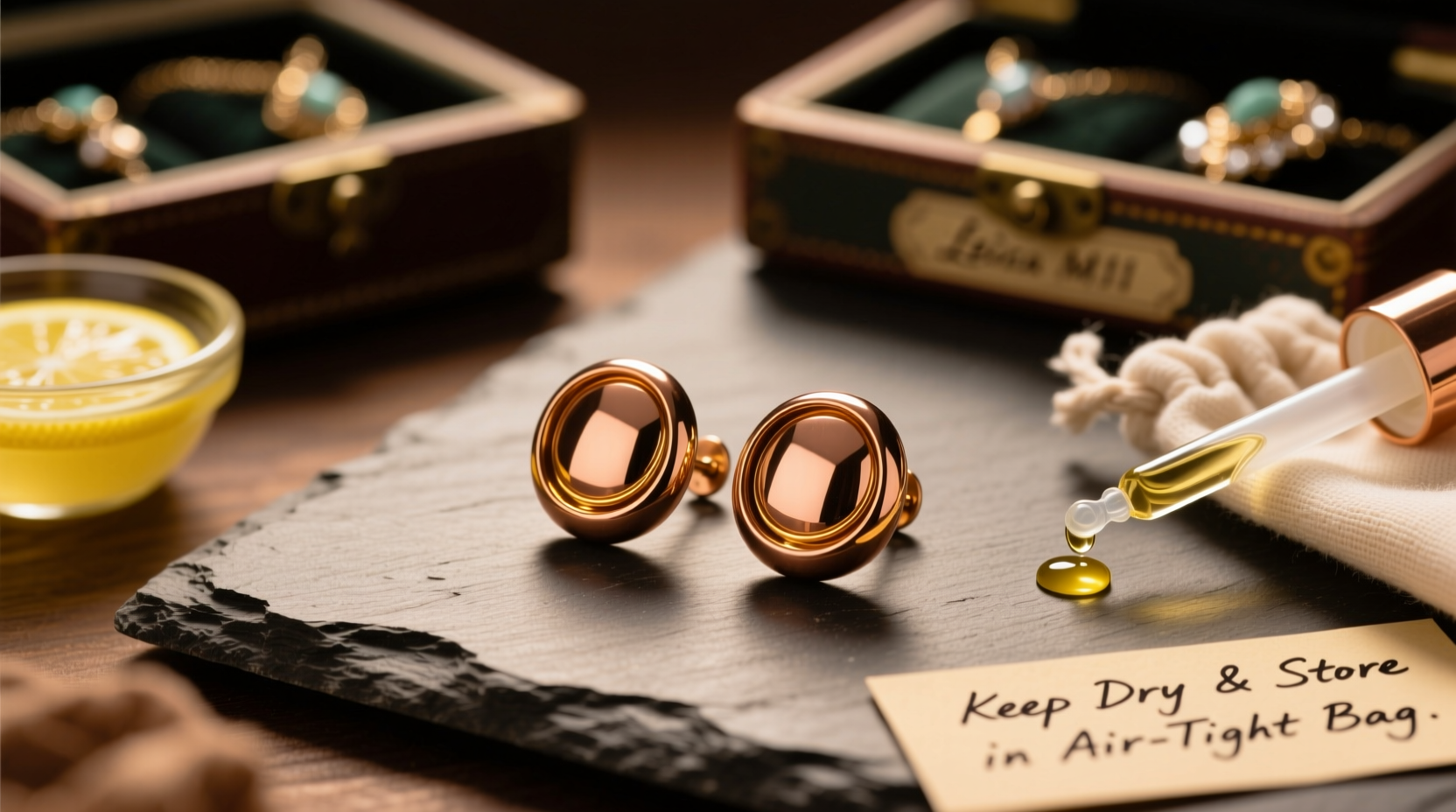Copper earrings possess a warm, earthy glow that complements both casual and formal styles. However, copper is naturally reactive, meaning it oxidizes when exposed to air, moisture, and skin oils—leading to tarnish over time. While some appreciate the antique look of patina, most prefer their earrings bright and lustrous. With the right care, you can maintain the original shine of your copper jewelry for years. This guide delivers practical, science-backed methods to protect your earrings from discoloration, preserve their brilliance, and extend their lifespan.
Understanding Copper Tarnish: Why It Happens

Copper reacts with sulfur compounds in the air and moisture to form copper sulfide, which appears as a dull brown or black film. Skin contact accelerates this process due to sweat, lotions, and natural pH levels. Humidity, pollution, and chlorinated water also contribute. Unlike silver, copper tarnishes faster because it’s more chemically active. Recognizing these triggers is the first step toward prevention.
“Copper is beautiful but reactive. The key isn’t avoiding exposure entirely—it’s managing it intelligently.” — Dr. Lena Reyes, Metallurgist & Jewelry Preservation Specialist
Tarnish doesn’t mean damage; it’s a surface reaction that can be reversed. But repeated polishing wears down fine details over time. Prevention, therefore, is more effective than restoration.
Effective Cleaning Methods for Shiny Copper Earrings
When tarnish does appear, gentle cleaning restores shine without harming the metal. Avoid abrasive tools or harsh chemicals that scratch or thin delicate earring posts or backs.
Vinegar, Salt, and Baking Soda Soak
A kitchen staple solution works surprisingly well. Mix 1 tablespoon of salt and 1 tablespoon of baking soda into ½ cup of white vinegar. Place earrings in the mixture for up to 5 minutes. The fizzing action lifts tarnish. Rinse thoroughly with water and dry with a soft microfiber cloth.
Lemon Juice and Salt Paste
Squeeze fresh lemon juice into a small bowl and mix with a pinch of salt to form a paste. Apply with a cotton swab, focusing on tarnished areas. Gently rub, rinse, and dry. Lemon’s citric acid dissolves oxidation safely, but avoid using on plated or porous stones.
Commercial Copper Polish (Use Sparingly)
Choose polishes labeled safe for copper, like Wright’s Copper Cream. Apply a pea-sized amount with a lint-free cloth, buff lightly, then wipe clean. Use only once every few months to avoid metal fatigue.
Step-by-Step Guide: Weekly Maintenance Routine
Consistent upkeep prevents heavy buildup and reduces the need for aggressive cleaning. Follow this simple weekly routine:
- Inspect earrings for early signs of darkening or residue.
- Wipe gently with a microfiber cloth after each wear to remove oils and moisture.
- Once a week, use a damp cloth with a drop of mild dish soap. Wipe surfaces, then rinse under lukewarm water.
- Dry completely with a soft towel before storing.
- Apply protective coating (optional): Use jeweler’s wax or clear nail polish on non-contact surfaces to create a barrier.
Smart Storage Solutions to Prevent Tarnish
How you store your earrings matters just as much as how you clean them. Air and humidity are primary culprits in tarnishing.
| Storage Method | Effectiveness | Best For |
|---|---|---|
| Airtight plastic bags with anti-tarnish strips | ★★★★★ | Daily protection, long-term storage |
| Felt-lined jewelry box with lid | ★★★★☆ | Regular use, multiple pairs |
| Open tray or hook display | ★★☆☆☆ | Short-term access, low-humidity rooms |
| Bathroom drawer | ★☆☆☆☆ | Avoid—high moisture and steam damage metal |
Anti-tarnish strips contain activated carbon or zinc that absorb sulfur gases. Place one in your jewelry box and replace every 3–6 months. Silica gel packets also help by reducing ambient moisture.
Do’s and Don’ts of Wearing Copper Earrings
Your habits while wearing earrings directly impact their longevity. Simple behavioral changes make a significant difference.
| Do’s | Don’ts |
|---|---|
| Put earrings on after applying makeup, perfume, and hairspray | Wear them while swimming or showering |
| Remove before exercising or sleeping | Store them loosely in a purse or pocket |
| Wipe them down if they get wet | Use paper towels or rough fabrics to clean |
| Rotate pairs to reduce continuous exposure | Leave them near humidifiers or stoves |
Copper conducts heat and reacts quickly to environmental shifts. Keeping it away from chlorinated pools, saunas, and salty ocean spray preserves its finish and structural integrity.
Mini Case Study: Reviving Heirloom Earrings
Sophia inherited a pair of handcrafted copper hoop earrings from her grandmother. Stored in a cedar box for decades, they were heavily tarnished—almost black. She avoided commercial dips, fearing damage to the intricate filigree. Instead, she used the vinegar-salt-baking soda method for 4 minutes, rinsed, and dried. After two rounds, the shine returned. She then coated the non-wearing surfaces with a thin layer of Renaissance Wax, stored them in a ziplock bag with an anti-tarnish strip, and now wears them monthly. Two years later, they remain bright with only light wiping needed.
This case shows that even severe tarnish is reversible with patience and proper technique—and that preventive steps afterward are crucial for lasting results.
Checklist: Copper Earring Care Essentials
- ✅ Microfiber cleaning cloths (lint-free)
- ✅ Mild dish soap (phosphate-free)
- ✅ Airtight storage bags or containers
- ✅ Anti-tarnish strips or silica gel packs
- ✅ Cotton swabs for detailed cleaning
- ✅ Optional: Clear nail polish or jeweler’s wax for sealing
- ✅ Soft-bristle toothbrush (dedicated to jewelry only)
FAQ: Common Questions About Copper Earring Care
Can I wear copper earrings every day?
Yes, but with precautions. Daily wear increases exposure to sweat and lotions, accelerating tarnish. If worn daily, wipe them after use and store properly. Consider rotating between multiple pairs to give each time to “rest” and air out.
Why do my copper earrings turn my skin green?
The green tint is a harmless chemical reaction between copper and your skin’s acidity or sweat. It’s not an allergy. To minimize this, apply a clear coat of nail polish to the back of the earrings or choose designs with hypoallergenic backings like surgical steel posts.
Are homemade cleaning solutions safe for all copper earrings?
Most solid copper pieces respond well, but avoid acidic cleaners on earrings with gemstones, enamel, or glued components. In such cases, use only a damp cloth and mild soap. Always test on a small area first.
Conclusion: Shine Starts with Smart Habits
Maintaining tarnish-free copper earrings isn’t about perfection—it’s about consistency. Small actions, like wiping after wear or storing in sealed bags, compound into long-term brilliance. You don’t need expensive products or professional services to keep your jewelry looking radiant. What you do daily matters most. By understanding copper’s nature and respecting its reactivity, you preserve not just appearance but sentimental value, craftsmanship, and personal style.









 浙公网安备
33010002000092号
浙公网安备
33010002000092号 浙B2-20120091-4
浙B2-20120091-4
Comments
No comments yet. Why don't you start the discussion?